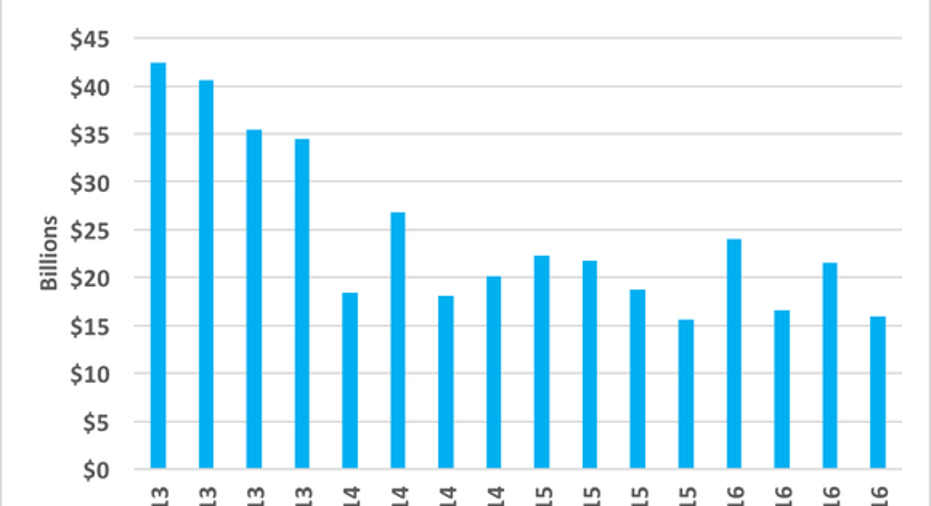Apple, Inc. Is Now Approaching $100 Billion in Debt

Just days after Apple's (NASDAQ: AAPL) earnings release last week, the company raised a cool $10 billion in debt. Like prior bond sales, this one consisted of numerous tranches with maturities of up to 30 years, and included both fixed-rate notes as well as some floaters. There wasn't really much that was notable about the bond offering itself; it's comparable to the paper that Apple sells every year.
|
Principal |
Fixed or Floating |
Rate |
Maturity |
|---|---|---|---|
|
$500 million |
Floating |
3-month LIBOR plus 8 basis points |
2019 |
|
$500 million |
Floating |
3-month LIBOR plus 20 basis points |
2020 |
|
$1 billion |
Floating |
3-month LIBOR plus 50 basis points |
2022 |
|
$500 million |
Fixed |
1.55% |
2019 |
|
$1 billion |
Fixed |
1.9% |
2020 |
|
$1.5 billion |
Fixed |
2.5% |
2022 |
|
$1.75 billion |
Fixed |
3% |
2024 |
|
$2.25 billion |
Fixed |
3.35% |
2027 |
|
$1 billion |
Fixed |
4.25% |
2047 |
Data source: Prospectus.
However, it was done a bit earlier the usual this time around, and Apple is now approaching $100 billion in debt.
It's the time of the season
Typically, Apple conducts these bond offerings shortly after providing updates to its capital return program, which is usually alongside its April earnings release. They usually occur in April or May. But Apple needed to sell the bonds slightly earlier this year for a few interrelated reasons.
Apple Store in Sydney. Image source: Apple.
Apple entered into its ninth accelerated share repurchase program last quarter, and total share repurchases were $11 billion. That took a big bite out of Apple's domestic cash position, and the company exited the quarter with $15.9 billion in domestic cash. That's the low end of Apple's comfort zone; Apple usually keeps its domestic cash in the range of $15 billion to $25 billion for operational and strategic needs.
Note how Apple's domestic cash has dwindled in recent years due to aggressive capital return activity. (This chart does not reflect the recent bond offering.)
Data source: SEC filings. Chart by author. Calendar quarters shown.
The company simply blew through its domestic dollars a little faster than usual this year with share repurchases.
$100 billion and counting
Since debt largely funds Apple's massive capital returns, the debt load that it has taken on over the past five years is commensurately large. At the end of 2016, Apple had $87.5 billion in long-term debt (including the current portion) and commercial paper, which is just short-term unsecured debt. The recent $10 billion bond offering will now bring that figure up to around $97.5 billion.
The offering was still able to fetch investment-grade credit ratings, but it goes without saying that the more debt that Apple takes on over time, the worse its credit rating profile becomes. Meanwhile, there's been a lot of talk about a potential tax repatriation holiday from the Trump administration. If Apple is able to bring home a meaningful chunk of the $230.2 billion that now sits overseas, it could theoretically extinguish some of that debt and strengthen the balance sheet. That could effectively give Apple a few more years to continue its debt-funded capital return strategy.
Until then, Apple will just have to keep selling paper.
10 stocks we like better than AppleWhen investing geniuses David and Tom Gardner have a stock tip, it can pay to listen. After all, the newsletter they have run for over a decade, Motley Fool Stock Advisor, has tripled the market.*
David and Tom just revealed what they believe are the 10 best stocks for investors to buy right now... and Apple wasn't one of them! That's right -- they think these 10 stocks are even better buys.
Click here to learn about these picks!
*Stock Advisor returns as of February 6, 2017
Evan Niu, CFA owns shares of Apple. The Motley Fool owns shares of and recommends Apple. The Motley Fool has the following options: long January 2018 $90 calls on Apple and short January 2018 $95 calls on Apple. The Motley Fool has a disclosure policy.



















